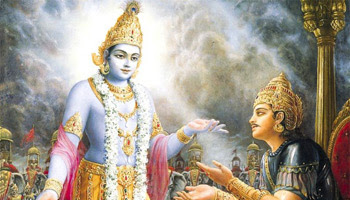Meaning of the word "Upaasana"and Its Characteristics
उपासना शब्दका अर्थ और उसका स्वरूप
continued........
There was a time when a brother had put forth a question in front of Shraddhey Seth Shri Jayadayal Goyandka, that ‘When everything is only God, then if we commit sins, then that too is through God only. ‘ये चैव सात्त्विका भावाः…..’ (गीता ७ । १२) ‘Whatever entities that exist, those that are born of Sattva (the quality of goodness), Raajasa (the principle of activity) and Taamasa (the principle of inertia), know them all as evolved from Me alone.’ (Gita 7/12) This too is proximity of God, and Ravan, Kumbhakarna etc., even though doing so much injustice, they too attained the same Paramatma, then why are we in bondage, in doing our duty !’ . In reply, Shraddhey Shri Sethji said ‒‘Whatever means we choose to become close to God, we will get the same kind of outcome, or form of God. Proximity of God in this manner, will get you sorrow-filled God ! Is God not adversity, sorrow, affliction etc ! Do the ‘Upasana’ (worship, proximity to God), according to the form of God you desire. If you worship God the way Ravan etc. did, then you need the kind of strength that besides God, I will not be killed by anyone else, then you will surely attain salvation. But if someone kills in between, then what will be the state ? You will be deprived of attaining your salvation. ‘जिज्ञासुरपि योगस्य शब्दब्रह्मातिवर्तते ।’ (गीता ६ । ४४) "Jigyasurapi Yogasya shabda Brahmaativartate." (Gita 6:44) A seeker of Yoga, transcends actions and their fruits as laid down by the Vedas, and will surely attain God Realization or salvation’ ‘In this genuine path, there is no betrayal.
Everything is only Paramatma. It means someone desires Paramatma with form, some desire the formless, attributeless Paramatma. Even in Paramatma with form, some desire Vishnu, Ram, Krishna, Shakti, Shiva etc. Whatever form one finds sacred, feels reverence for, has interest in , and has inclination towards that form, then by worshiping and getting closer to that Form, one attains that Form. Then by Bhagwan’s grace, he will attain the Real and Innate Self, which he beyond the mind and speech.
In Karmayog too one has to come close to the Real, Truth. In this, there should be renunciation of the fruit of actions and attachment. People say, that ‘sense of mine and attachment’ are difficult to get rid off. On this subject, one must think, that does the attachment remain the same at all times ? Previously, the fondness that mother had for her child, does it remain the same later on ? See it with anything, constructing a new house, designing and making your jewellry and clothes, the joy you experienced for 2-4 days, does that joy remain the same later on ? Now think about whether any objects in this world will stay with you ? Leaving fondness, attachment, and sense of mine in these objects, and instead having fondness, attachment, and sense of mine with only Bhagwan, you will become immensely blessed.
All the objects in the world are perishable. There is nothing to get from them. Only the inner-senses will become impure, there will be lack of peace. Mother-son have much fondness for each other, and the son also conducts his life in a way that is favorable to the mother. But on growing up, when he listens to his wife, and does things that are not favorable to the mother, then the attachment and sense of mine cannot not remain, it breaks off. Therefore it is not difficult to renounce sense of mine; it is more difficult to hold on to ‘Mamta’ (sense of mine). It does not remain the same at all times, rather it keeps changing. From this it is proven that love, fondness, has not been directed to a genuine place.
A five year old son, is searching for his Maa. Other mothers are sitting there, and on being asked, they say they too are Maa, but the child does not say Maa to any of those mothers. If his Maa would be there, he would immediately go to her lap ‘ममैवांशो जीवलोके’ (गीता १५ । ७) ‘Mamaivaansho Jeevaloke’ (Gita 15/7) You are a part of Me alone. (Gita 15/7). Therefore it has been said in the Gita ‘यं लब्ध्वा चापरं लाभं मन्यते नाधिकं ततः ।’ (गीता ६ । २२) 'yam labdhvaa chaaparam laabham manyate naadhikam tatah.' (Gita 6/22) i.e. 'Having realized whom there is no gain higher than that.'
In Karmayog, one renounces the desire for fruit. The sentiments of being desireless means ‘कर्म चैव तदर्थीयम्’ (गीता १७ । २७), "karma chaiva tadarthiyam sadityevabhidhiyate" (Gita 17/27). Whatever is done for God, all becomes "sat" (existence, real, truth), ‘नेहाभिक्रम-नाशोऽस्ति’, ‘स्वल्पमप्यस्य धर्मस्य’ (गीता २ । ४०) Nehaabhikramanaashosti pratyavaayo na vidyate (Gita 2.40) "You need not worry after surrendering yourself to Me." etc. If one does not leave the sense of mine, then moving forward, it will be difficult to become inclined towards God. There is much fondness and sense of mine, between Mother-son, husband-wife, brothers, but the moment there is obstacle in favorable situation, the moment there is a hitch to selfishness, the sense of mine and attachment does not remain. Therefore Goswamiji says ‒
जननी जनक बंधू सुत दारा ।
तनु धनु भवन सुख परिवारा ॥
सब कै ममता ताग बटोरी ।
मम पद मनहि बाँध बरि डोरी ॥
From book in Hindi "Ekai Saadhe Sab Sadhe' by Swami Ramsukhdasji






